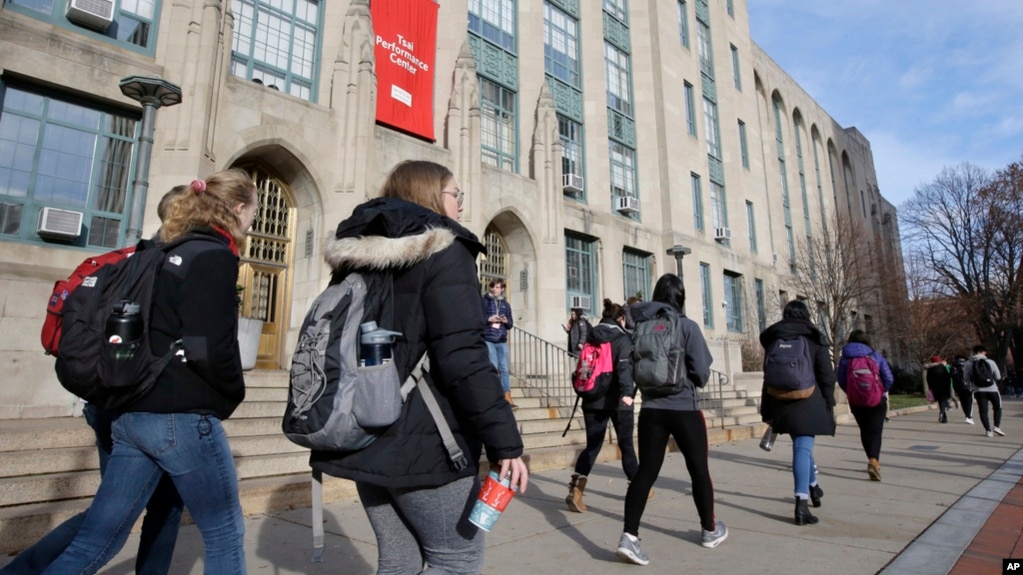It’s H1B Lottery Season Again: Low Winning Rate, Fewer Job Opportunities Chinese Students Lament It’s Getting Harder to Stay in the U.S.
又是H1B抽签季:中签率低、工作机会少 中国学生感叹留美愈发不易
March 26, 2024
- Liu Wen , writer

AUSTIN – “It’s better to go through the line, don’t have to spend so much money, and come to the U.S. (soon) to work,” Wendy, who is about to graduate with a master’s degree this year, told Voice of America. Before coming to the U.S., she, who majored in English as an undergraduate, had more than a decade of work experience in China. During the epidemic, her brother, a businessman, realized that China’s economic outlook was deteriorating and that government regulations were gradually intensifying, so he suggested that her younger sister study in the U.S. to “run abroad”润[See 2023: Runological Studies: Leaving China, Wikipedia article Rùn (meme) ].
Because of her hasty preparation, Wendy only applied to a master’s program majoring in literature, and her job search was far less successful than that of Chinese students studying programming or finance, and all the resumes she sent out sank into the sea. The non-STEM (Science, Technology, Engineering, Mathematics) majors only have a one-year OPT visa (i.e., Professional Internship Visa) after graduation, and if she does not obtain an H1B (Visa Specialty Professional/Temporary Worker Visa) through the lottery during this year, her options to remain in the U.S. will be very limited.
For Wendy, disillusioned with the state of society in China these past few years, she hoped to give a foothold in the U.S. so that her parents and brother would have an option to come to the U.S. as well. But the reality was more difficult than expected. Other immigration options, such as investment immigration, also require long waiting periods. She recently flew to New York for an interview and was even envious when she saw the saw people who had “travelled the route”, crossing the US border illegally, gathered in Flushing, New York, chatting and chilling.
Tech and finance firms lay off workers amid poor U.S.-China relations
“I’ve talked to my seniors and sisters, and my work experience in China doesn’t give me much of an advantage in the U.S. hiring market right now, but before the U.S.-China trade war, speaking Mandarin and understanding the Chinese market was actually kind of an advantage,” Wendy told Voice of America.
She had worked as an interpreter in China, was posted overseas, and worked her way up to a senior manager position in a trading company, but was having trouble finding positions in the U.S. that could capitalize on her original work experience. Her brother introduced her to Silicon Valley investment firms through his contacts, but the firms said that they had recently reduced their investment in China and had even withdrawn from the Chinese market, and no longer needed Chinese people with Wendy’s background.
China’s State Administration of Foreign Exchange (SAFE) released balance of payments data for 2023 on February 18, showing that direct investment in China by foreign companies fell to its lowest level in 30 years.
Shaun Liu, who is pursuing MBA in Texas, feels that it is difficult for international students to find suitable jobs because of status concerns: “In the process of casting jobs, it feels that Sponsor H1B itself has really become a restriction, like many of our classmates come to Texas to run for the energy industry, but the big oil companies don’t provide H1b Sponsor. “Originally, he had a legal background in China but because of the visa restrictions, it is also difficult to find a job related to it.
In California Zoe Wu found a job at a film and television company that utilized her strengths and received praise from her supervisor for her work projects. But when she was about to apply for her H1B visa, she suddenly learned that the company had decided not to help its employees apply for H1B visas. She was caught off guard and had to leave her job immediately to find an employer who could help her apply for an H1B visa as soon as possible.
Because of the time-consuming and costly process of helping employees obtain H1B visas, many companies that can recruit enough local U.S. graduates are reluctant to go the extra mile. Tech companies and headline banks are among the few employers willing to help with the H1B process. The wave of layoffs in US tech and financial firms over the past year or two has also affected international students looking for jobs. 2023 saw more than 260,000 layoffs in the US tech industry, led by Silicon Valley, and the wave of layoffs continues in 2024 as well, with thousands of layoffs at both Google and Microsoft in January of this year. Last year’s slump in earnings at major U.S. banks also sparked a wave of layoffs in the financial sector. Citigroup, for one, announced it would lay off about 20,000 workers.
Sean says Chinese students have had a tough time finding jobs this year: “Our Chinese students in this class are not doing too well, and overall employment for the whole year is worse than last year, like 60% didn’t find summer interns, last year at this time it was about 50% to 40%.” He believes this is a problem within the industry, which is still digesting the over-recruitment that occurred during the epidemic.
Since last year, firms such as Deloitte, KPMG, Boston Consulting Group, and McKinsey have pushed back the start date of their 2023 hires to 2024, according to the Wall Street Journal. And these well-known consulting firms are a favorite destination for MBA graduates. According to a survey last year by Intelligent.com, 68 percent of MBA students who graduated last year did not find full-time jobs, and 28 percent of those who did find full-time jobs won’t start until 2024.
It’s all luck of the draw.
The H1B lottery takes place in March every year. After graduating from a U.S. college or university, Chinese students will be granted a one-year OPT temporary work permit, which is equivalent to one chance if they find an employer who is willing to help them with the lottery, while international students majoring in STEM can be granted a three-year OPT after graduation, which gives them three chances.
The annual quota for H1B visas is fixed at 85,000 (including 20,000 for applicants with master’s degrees and above), which also includes 6,800 quotas that must be given to Chilean and Singaporean citizens. As the number of registered applications grew, the winning rate declined. During the COVID epidemic, the number of applicants rose exponentially. 274,000 registered for H1Bs in FY 2021, 309,000 in FY 2022, a further dramatic boost to 484,000 in FY 2023, and a jump to 790,000 in FY 2024. And as a result the probability of each applicant winning the lottery is greatly reduced. According to statistics, the winning rate for FY 2024 is only 14.6%.
Jane Ding, who works at Ernst & Young, one of the Big Four accounting firms, didn’t win the lottery last year. Her undergraduate degree was in accounting in Beijing, and she traveled to the U.S. in 2019 to study for a master’s degree in accounting in New York. She said she didn’t have a relatively hard time finding a job. “It was relatively easy for us accounting majors to find a job, and I myself started seeking Big 4 internships just after I was accepted for my master’s degree, so I came to my internship, EY, directly after I graduated from my master’s degree and started working.”
With three years of OPT, she will continue to get her work visa through the lottery this year, but the H1B that she can only get if she is lucky makes her not so sure about her future in the US and the thought of going back to her home country. “On the one hand, my family’s connections are all in China, and as a girl, they prefer me to go back to my home country. On the other hand, work visas in the US are more based on luck than anything else, and I’m preparing for something else at the same time.”
Dr. Cui Kai, a graduate of the University of Florida’s Department of Educational Administration, has spent the past 18 years providing Chinese students and parents with consulting services for entering U.S. high schools and colleges. He told Voice of America that there is a certain element of luck in the H1B visa lottery mechanism because of the limited visa quota.
“An applicant’s success in the lottery does not depend solely on his or her personal ability or background, but is influenced by the randomness of the lottery process. This lottery mechanism may result in some outstanding applicants being unable to obtain visas while some less qualified applicants are able to obtain visas through the lottery, raising questions about fairness. It is particularly unfair for applicants with high academic qualifications (master’s degree or above).” He said.
Because non-STEM majors can only be drawn once, he has encountered many liberal arts and social science students who were not able to win the lottery and had to seek to re-enter the U.S. (F visas), exchange scholars (J visas), and other ways to remain in the U.S. to maintain their legal status.
But Sean, who studied in Texas, is still cautiously optimistic about the H1B lottery. “This year’s H1B lottery has also been adjusted to patch up the original loophole where many Indians used multiple companies to draw at the same time, so maybe the probability of winning can be higher as well.”
Is the alignment craze making international students feel unjust?
Since the route known as “travelling the route” 走线 2022 has been circulating in China on social media such as Jitterbug, more and more people from China have embarked on the route originally traveled by people crossing the US southern border illegally and refugees.
Interlude — from Wikipedia in Chinese:
The route for illegal immigrants who take the route generally starts in Ecuador, South America (because Ecuador is visa-free with the People’s Republic of China), and travels through Colombia, Panama, Guatemala, Mexico, and other countries before finally entering the United States to apply for asylum. [4][5] This is a dangerous route, as Colombia requires a nighttime speedboat ride, which takes about two hours to navigate through the waves at night with the lights turned off. Disembarkation requires a hike through the Panamanian jungle known as the ” Darién Canyon ” (also known as the Darién Jungle and Darién Rainforest), formerly used mainly by Cubans and Haitians, with a few Nepalese, Indians, Cameroonians and Congolese.[6][6][7] It is a dangerous route in Colombia. [6]
People from mainland China who take the route are usually young males. The route mainly involves visa-free entry into Ecuador from mainland China, with many of them flying to Turkey and then connecting to South America. Afterwards, the route-takers take a bus to Tulcan on the Ecuadorian border, then charter a bus or take a plane into Colombia, arrive in the coastal town of Necocle in northwestern Colombia, pay a local guide, and follow in the footsteps of the Latin American people-smugglers by buying a ticket for a boat to enter the island of Capuana, waiting for a speedboat to rush through the border, and then entering the Darién Canyon. [3]
Those who choose to take the risk of “walking the line” are mostly from lower-middle class groups in mainland China, while educated and affluent mainland Chinese immigrate through legal channels such as student and work visas. After entering the country, they turn themselves in to U.S. border officials, are sent to prisons where illegal immigrants are held, and then apply for asylum on the plausible grounds that they will be persecuted if they return to mainland China. According to the U.S. Department of Justice, asylum seekers from mainland China have a 58% success rate in U.S. immigration court.[7] Many of these asylum seekers have a high rate of success in U.S. immigration court. [7] Many are released within days and are able to work in the U.S. once their asylum claims are accepted. [6]
Scope
According to U.S. government data, 24,000 mainland Chinese came to the U.S. by walking the line in fiscal year 2023. 2024 reached 18,755 as of February, and is predicted to exceed the 2023 number [8] while in the 10 years from 2012 to 2022, fewer than 15,000 mainland Chinese immigrants have been caught illegally crossing the southern border. [5] U.S. Customs and Border Protection data show that more than 6,500 mainland Chinese citizens were apprehended at the U.S.-Mexico border between October 2022 and April 2023, the highest number ever recorded and more than a 15-fold increase over the same period a year earlier. [7] There have also been line-walking Chinese deaths in Mexico. [9]
The Panamanian government recorded that of the 250,000 people who crossed into Panama from Colombia in 2022, more than 2,000 were mainland Chinese, six times the number in the 10 years before the epidemic combined. Between January and July 2023, the number of mainland Chinese crossing into Panama from Colombia topped 10,000 after Beijing abandoned its clearance policy. [4]
走綫 “Walking the Route” from Wikipedia in Chinese.
End interlude
Some immigration attorneys have revealed that people who walk the line often file asylum claims upon arrival in the United States. They can apply for a work authorization at least six months later, regardless of whether they will be able to obtain a green card in the future. Once they are granted a work permit, they can apply for a Social Security number and a driver’s license so that they can live normally in the United States. If their asylum application passes the “credible fear interview,” they can go to immigration court. If they do, they have to wait a year before applying for a green card. However, if their application fails, they have the opportunity to appeal.
Wendy feels that some of the people who walk the line to gain asylum by faking or packaging their so-called experiences of oppression is unfair to those who enter the U.S. through legal means and hope to eventually stay, and it may even affect their future immigration applications as well. “If there are more Chinese people walking the line, will it make it harder for Chinese people to apply for tourist visas and study visas in the future?”
Jane has similar views. “A lot of people, who come to the United States without background checks, stay through various illegal means, and this is also a huge burden to the American society,” she said, “I personally feel that these people should not actually be allowed to stay because it would be an unfair situation for those of us who have worked so hard to fight on our own to to stay and pay taxes legally, there will indeed be an unfair situation.”
The sharp increase in the number of Chinese immigrants arriving in the U.S. through the pipeline has indeed raised national security concerns in the U.S., with some questioning whether there are Chinese spies among them.
Republican Rep. Mark Green, chairman of the U.S. House of Representatives Homeland Security Committee, sounded the alarm last June about a wave of Chinese walk-ins into the United States, claiming that most of them were military-age men and women with ties to the Communist Party of China (CPC) and the People’s Liberation Army (PLA). Green, along with senior Republican Senator Marco Rubio and Republican U.S. Representative Troy E. Nehls of Texas, co-sponsored the No Asylum for CCP Spies Act last year, which, if passed, would have prevented members of the Communist Party of China (CPC) from seeking Asylum.
The reporter contacted the U.S. Department of State and the U.S. Citizenship and Immigration Services (USCIS) on whether the significant increase in Chinese walk-ins would affect the approval of nonimmigrant-type visas for Chinese nationals, as well as the background check and approval process for Chinese nationals who come to the U.S. to apply for a green card through legal channels, respectively. However, USCIS was not available for comment and asked the reporter to contact the U.S. Department of Homeland Security.
The U.S. State Department is committed to ensuring national security while facilitating legal travel to the United States, a State Department spokeswoman told Voice of America. The number of visas issued by U.S. embassies and consulates in China increased by 325 percent in fiscal year 2023 compared to the previous fiscal year, with the number of visas rising rather than falling. In terms of student visas, “In FY 2023 alone, the U.S. issued more than 105,000 nonimmigrant visas to Chinese students and scholars newly admitted to the United States. China remains the number one source country for foreign students in the United States.”
Walkers Speak Out: Walking the Route is Not Like Studying Abroad, Applying for Asylum is Not Easy and Highly Risky
Wang Zhongwei, 33, of Anhui Province, entered the United States by “walking the line” last May. He said he has also been approached recently by a number of Chinese people seeking advice on staying in the U.S. by applying for political asylum.
He mentioned one of the families. “The child is on a student visa and the parents are on a tourist visa. (The child) was enrolled in school as an international student, which is very expensive. I heard about the local student tuition fees being one-sixth of his, so I want to seek to apply for a change of status to enroll as an asylum seeker.” He said he had heard that the child’s parents may have suffered some persecution in China.
He himself agrees that walking the route may indeed be cheaper, if you look at it from a cost standpoint alone. “A study visa is not as good as walking the route, if you’re talking in terms of financial cost,” he said, “but of course what’s more decent and cost-effective than either of those is to come to the U.S. on a tourist visa and then file an asylum claim. Enroll in school after status change.”
By his own admission, “there is the existence of falsified documents for asylum,” but says applying for an asylum visa is not simple either. “The way the U.S. government goes through the immigration court process is the same way it’s doing the maximum possible screening out of people who don’t qualify for asylum. Most of the people with fake documents for asylum are denied, and only very few get through. Asylum applications have a relatively low barrier (financial cost) and are available to all, and international students can also turn to apply for a change of status by way of asylum if they feel it is unfair.”
The fact is that neither route is easy to legally remain in the United States to live and work. Currently, there is a significant backlog of applications for both employment-based and asylum-based green cards at USCIS.
As of March 2023, the backlog of employment-based green card applications has grown to 1.8 million, with the quota cap set at 140,000 per year, plus any unused family-sponsored green cards, according to a briefing note released by U.S.-based think tank the Cato Institute in February.
Many Chinese applicants have been waiting for ten years. There are usually two steps in a political asylum application hearing: the first is a pre-trial hearing, where the average wait time is about three years, and the second step is an individual scheduling hearing, where the wait time is less than five years. This also means that there may be a long period of time in which many people have no way of obtaining legal status and have difficulty finding good-paying, stable jobs.
But education consultant Kay Choi argues that walk-ins will have a hard time finding a job after coming to the U.S., even if they get an asylum green card. They are also less likely to compete with international students for well-paying positions in big tech companies. He said the restrictions in U.S. immigration policy and the low lottery rate for H1B visas may cause more people to choose to stay in the U.S. by “walking the route” or other illegal means, and therefore he believes the U.S. should “take into account the actual situation of international students and their contribution to U.S. society, in order to formulate a fairer and more inclusive policy. policies”.
Sean, a Chinese student in Texas, told reporters that the group of “took the route” also have their difficulties. “I think they have to survive here, the difficulties they face will only be more than those of us who come to school, language, culture, socialization, etc., and recently also see some reports, or the person short video themselves confided how they had been cheated by some “secret intermediary’, they are unable to earn much money. Over the short-term, those who “walked the route” are basically not competing or in conflict with those who came to study abroad. Most of them got a work permit and took blue-collar jobs.”
He hopes that politically influential Chinese-American will speak out on the difficulty of the H1B lottery and on behalf of those Chinese having trouble getting H-1Bs call for reform in immigration policy to give greater preference to talented people.
(This article has been updated to include a response from the U.S. Department of State.)



